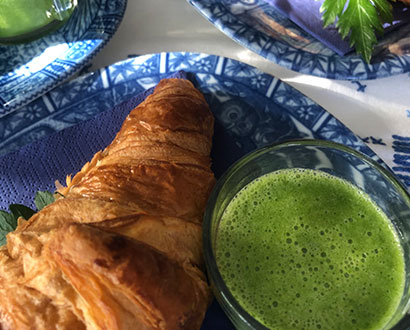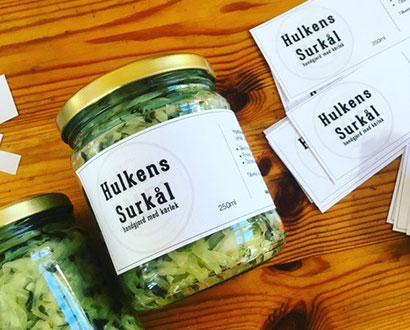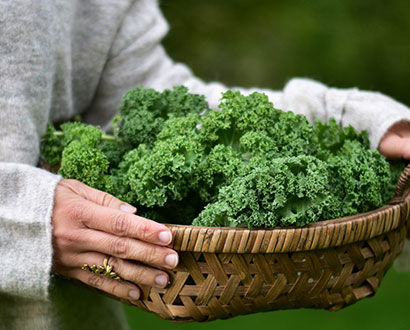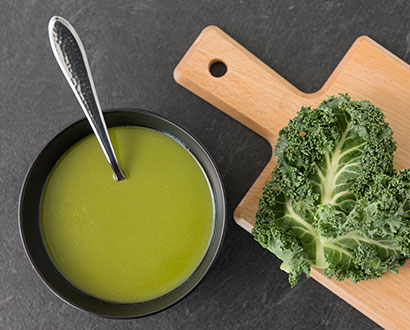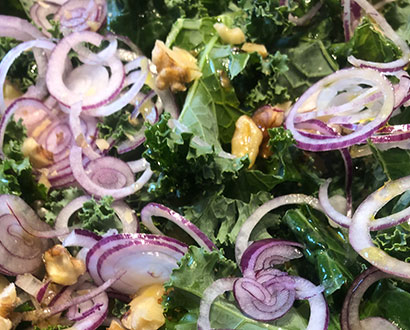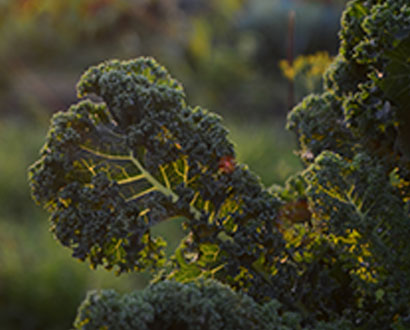- Startsida
- En
- Food and drink
- Curly kale – Halland's superfood
Curly kale – Halland's superfood
We love curly kale! Curly kale has a strong tradition in Halmstad and Halland. So much so that it has been designated our national dish and has its very own day on 14 September.
That we in Halmstad and Halland love curly kale is no secret. After all, it is our national dish. Ask any local what is a must on the Christmas table and you will certainly get the answer "curly kale". Nowadays, we eat curly kale all year round. But where does this interest come from originally?
The history of curly kale in Halland
It has been well known for a long time that curly kale has been eaten in Sweden for many years. There was curly kale in Sweden in the 14th century and probably earlier than that. Even then, there was talk of kale farms being common both in the countryside and in the towns.
In the 19th century, many poor Halland residents went to northern Germany to find work. Here there was great interest in curly kale. It is said that when they returned home, they brought the interest in curly kale with them and created new eating habits with this much appreciated ingredient. The fact that curly kale could also be grown in Halland, as it had been for many years, helped to strengthen the tradition.
Long kale and other dishes
Curly kale has long been associated with a dish called långkål (long kale) that belongs on the Halland Christmas table. Everyone has their own special touch for how the långkål should be cooked. But as a rule, it is kale leaves that are cooked in ham stock (from the Christmas ham) after which they are potted and flavoured with syrup.
Today, however, you can find curly kale in all sorts of dishes and snacks. In everything from smoothies and salads to chips and crispbread. In recent years, kale has become increasingly popular, with many of its health benefits often being highlighted. It is often referred to as a "super vegetable" or "super food".
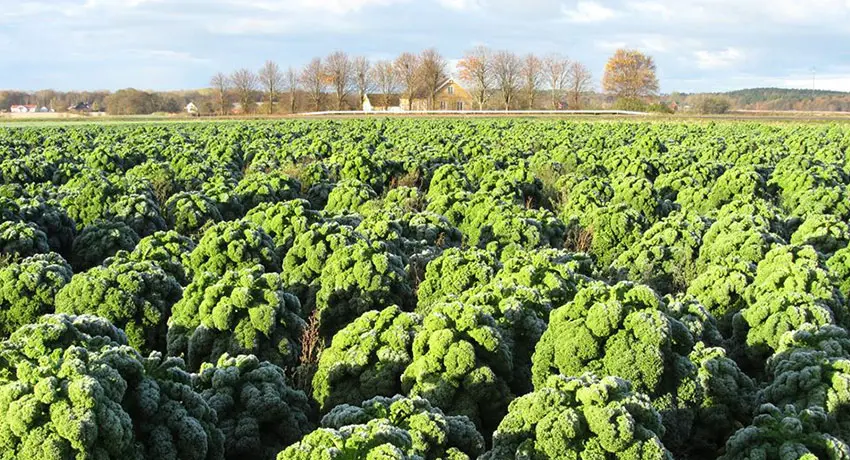
Harplinge Grönkål (Harplinge Kale)
Curly kale in Halmstad
In Halmstad, curly kale is available everywhere. During harvest times you can find kale at many food markets and in farm shops. At this time you will find Hulkens's sauerkraut at PaulssonsPaleo. Steninge Kuststation often offers kale dishes, including tasty kale smoothies. Steninge Kuststation also dedicates a full day in September in honour of curly kale. Here everyone can both harvest and then prepare several dishes together.
At Börjes Konditori in Harplinge you will find yummy kale crackers. All year round you can enjoy Tallhöjden inn's tasty kale soup. At Christmas time you will of course find the famous long cabbage on most, if not all, Christmas dinner tables in Halmstad. The largest curly kale producer in Halmstad is Harplinge Kål. You can buy their kale in several stores in Halmstad and southern Sweden.
Five delicious curly kale recipes
Below you will find five very good recipes you can make with curly kale. The recipes come from Steninge Kuststation and PaulssonsPaleo.
Hulken's Sauerkraut – from PaulssonsPaleo
This particular sauerkraut got its name from the lovely green kale colour. The base is white cabbage as kale does not contain enough sugar to form lactic acid on its own, but the taste is distinctly kale! You can vary the amount of curly kale and cabbage up to 50/50, depending on how much kale you want.
Here's what you need:
- 1 cabbage head
- A few handfuls of kale
- Sea salt without additives (1.5% of the weight of the vegetables)
- Clean glass jars with screw lids
- Extra cabbage leaves
This is what you do:
- Remove one of the outer leaves of the cabbage and set aside.
- Weigh the cabbage and kale.
- Calculate the proportion of salt: for example, 1 kilo of cabbage and kale needs 1,000g x 0.015 = 15g salt.
- Slice the cabbage finely with a knife. Tear the kale into smaller pieces and chop it.
- Put the cabbage, kale and salt in a mixing bowl. Knead the cabbage and kale thoroughly with your hands, so that it forms liquid, preferably for up to ten minutes.
- Press the chopped cabbage and kale down into clean glass jars. Pack in the cabbage and kale thoroughly and pour on the remaining liquid (discard excess liquid if it doesn't all go in).
- Leave a few centimetres free at the top of the jar and press down a piece of a cabbage leaf to keep the chopped vegetables down.
- Screw the lid on a little loosely so that gas and extra liquid can come out, but no oxygen gets into the jar (alternatively, you can release any pressure in the jar during the first few days).
- Place the sauerkraut on a platter in a place where it can stand for two weeks. Make sure the temperature is between 18–22 degrees.
- After 2 weeks, tighten the lid properly and put the sauerkraut into the refrigerator to mature for another two weeks.
The sauerkraut can be enjoyed with most cold and hot dishes - perhaps with the exception of dessert and morning porridge!
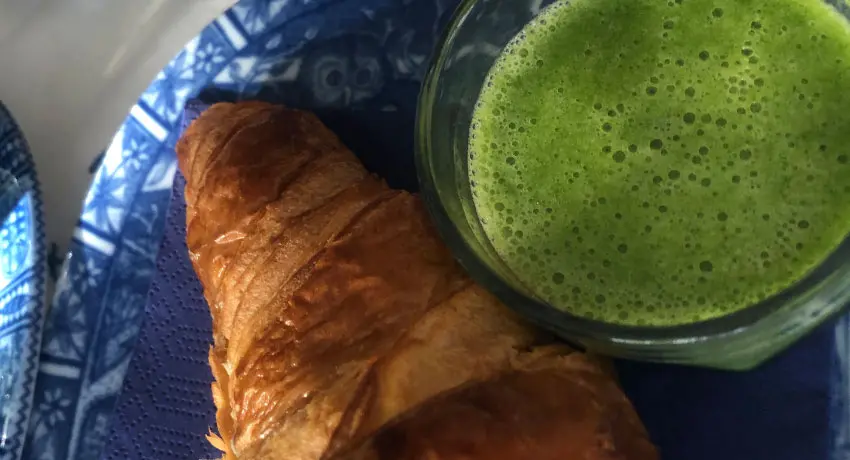
Photo: Steninge Kuststation
Curly kale smoothie – from Steninge Kuststation
- 2 normal-sized curly kale sprigs
- 2 tablespoons grated ginger
- 1 dl frozen mango
- 2 dl orange juice
- Three sprigs of mint
Put everything into a blender and mix into an even smoothie.
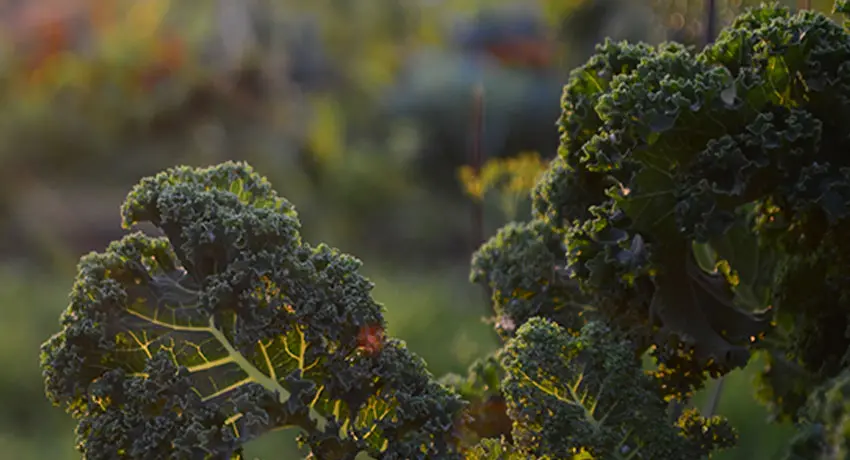
Photo: Mostphotos, Kaprisova
Curly kale frittata with marinated salmon – from Steninge Kuststation
The recipe makes 4 servings.
Ingredients:
- 8 dl chopped fresh curly kale
- 100 grams marinated salmon (gravad lax) in thin slices
- 25 grams butter
- 5 eggs
- 1 dl milk
- 1 ½ teaspoons salt
- 2 ml white pepper
- 2 dl grated Kvibille cheddar
This is what to do:
- Preheat the oven to 225 degrees.
- Chop the curly kale.
- Cut the salmon into thin slices and then shred them.
- Put the butter in an ovenproof dish and let it melt in the oven.
- Whisk together the eggs, milk, salt and pepper in a mixing bowl.
- Stir in the kale, salmon and 2/3 of the cheese in the ovenproof dish.
- Sprinkle with the rest of the cheese and bake in the middle of the oven for 15–18 minutes until the frittata is just set and has a little colour.
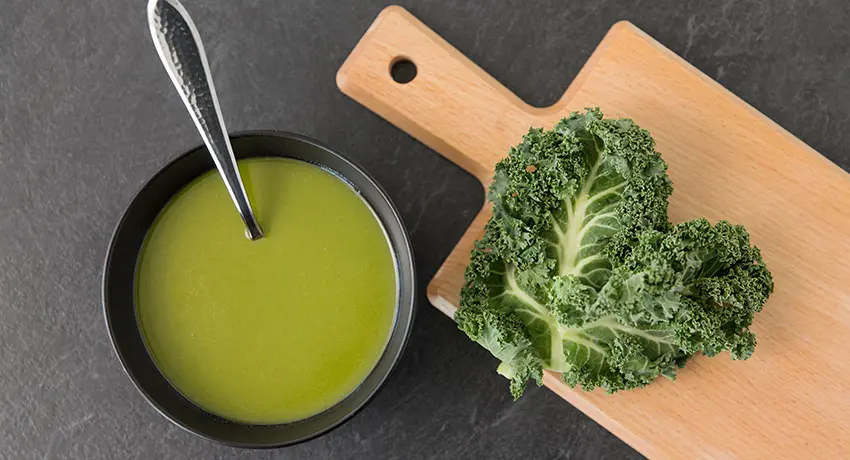
Photo: Syda Productions, Mostphotos
HarplingeKål’s Kale Soup
Ingredients
- 250 g HarplingeKål kale
- 2 tbsp butter
- 2 tbsp wheat flour
- 5 cups water + 1 bouillon cube (vegetable or chicken) or 5 dl mild broth
- 5 dl milk
- salt and white and black pepper
- 1 dl crème fraîche
- boiled eggs, for garnish
Preparation
- Fry the butter and flour.
- Pour in the broth and water and dilute this mixture with milk.
- Add the chopped HarplingeKål kale. Bring to a boil. If you want the soup smooth, puree it with a handheld blender.
- Season and boil for about 5 min.
- Finally, stir in the crème fraîche. Season to taste with salt and pepper.
- Serve the soup with halved boiled eggs. A toasted cheese sandwich makes the perfect accompaniment.
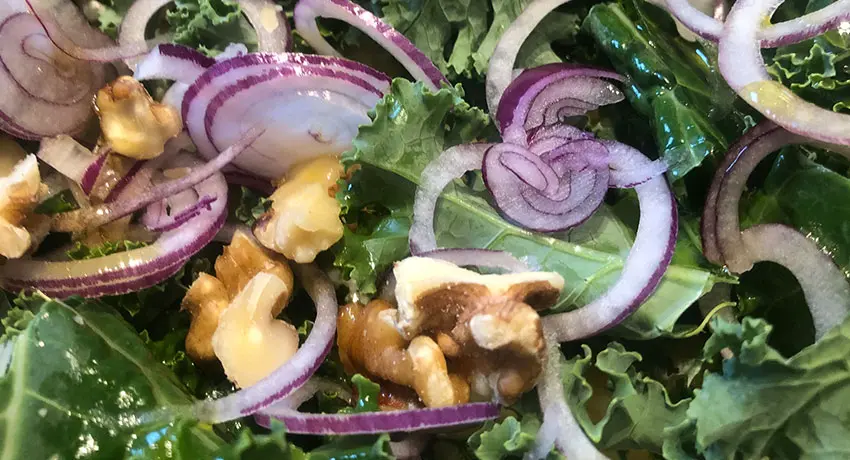
Photo: Steninge Kuststation
Curly kale pizza – from Steninge Kuststation
Pizza bianco with curly kale, silver onion and red seaweed caviar.
The recipe makes 4 servings
Ingredients: the dough
- 2½ dl lukewarm water max 37°
- 2 msk rapsolja
- ½ tsk salt
- 6 dl vetemjöl
Ingredients: filling
- 2 silver onions
- 1 clove garlic
- 2 tablespoons butter
- ½ teaspoon salt
- 1 ml black pepper
- 4 dl grated kale
- 6 cooked, peeled new potatoes
- 200 grams mozzarella
- 1 dl grated Kvibille cheddar
- 2 dl crème fraiche
- 0.75 dl red seaweed caviar
This is what to do:
- Start with the dough.
- Crumble the yeast in a mixing bowl. Add water, rapeseed oil, salt and flour. Work to a smooth dough.
- Let it rise for about 30 minutes, covered. Preheat the oven to 225 degrees.
- Tip the dough out onto baking paper and roll out. Add the filling. Bake in the middle of the oven for about 15 minutes.
- Time for the filling.
- Peel and cook the new potatoes.
- Make the pizza dough according to the recipe.
- Preheat the oven to 250 degrees.
- Press out the dough thinly and place it on an oven tray with baking paper.
- Peel and cut the silver onion and garlic into thin slices. Fry these in butter without colouring. Add salt and pepper.
- Mix the kale with the onion mixture.
- Slice the potatoes thinly.
- Grate the cheeses (cheddar and mozzarella) coarsely.
- Spread the crème fraiche on the pizza dough, add the cheese, cabbage mixture and potatoes.
- Bake in the middle of the oven for about 15 minutes.
- Top with red seaweed caviar and serve. This pizza can also be eaten cool.
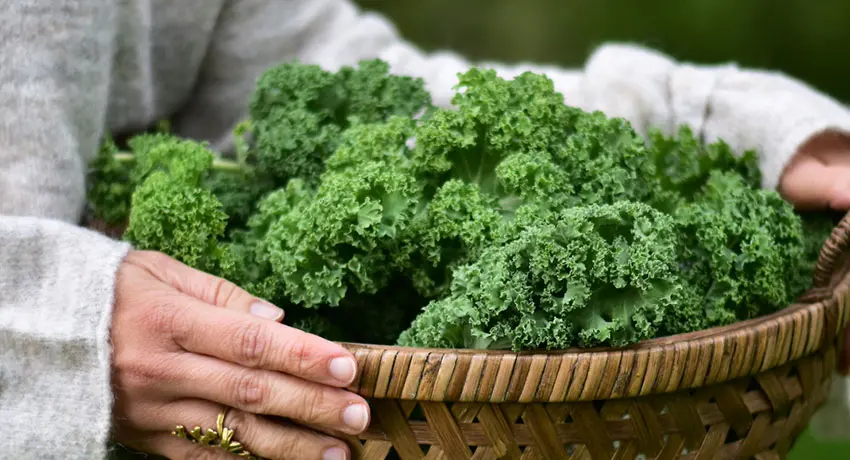
Photo: Agneta Kristiansson
Curly kale cocottes – from Steninge Kuststation
The recipe makes 6 serving moulds.
Ingredients: cocottes
- 10 dl chopped kale
- 2 tablespoons rapeseed oil
- 250 grams Kesella cottage cheese
- 1 egg
- ½ teaspoon nutmeg
- 1 teaspoon salt
- 1 ml black pepper
Ingredients: the sauce
- 1 dl mayonnaise
- 1 dl crème fraiche
- 1 crushed clove garlic
- 1 dl finely chopped chives
- Finely grated lemon zest (of about half a lemon) and 2 tablespoons squeezed lemon juice
- 1 dl chopped hazelnuts
This is what to do:
- Fry the kale in a pan with the rapeseed oil.
- Preheat the oven to 200 degrees.
- Mix all the other ingredients in a bowl and stir in the slightly cooled kale.
- Distribute the kale mixture into six greased ovenproof portion moulds that hold about 1 ½ dl.
- Place the moulds in a pan and pour hot water around so that it reaches half the height of the moulds.
- Bake the cocottes in the middle of the oven for 20–25 minutes.
More Halmstad
-
Inspiration and guides
Can I bring my dog to Halmstad? No problem!… -
Nature and the outdoor life
Ahh! The Halmstad air! Filled with the tangs… -
Beach and coast
Shimmering sea and colorful sunsets are only… -
Food and drink
Food and drink is not just food and drink.… -
Culture and history
In Halmstad we deliver both culture and history… -
Events
Theatre? Concerts? Art exhibitions? Sport?… -
Spa and wellness
Taking an invigorating dip in the sea, lacing… -
Shopping
Shopping is an experience in itself. Perhaps… -
The Swedish capital of golf
153 golf holes, eight unique resorts in a… -
Good to know
We have gathered together a few practical… -
Accommodation
Where would you like to stay? In a castle… -
Sports and activities
Do you like being active? Raising your pulse,…

